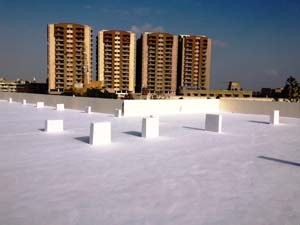Membrane Sheet Waterproofing Services – Brooks Chemical Services
Membrane sheet waterproofing is a highly effective solution for protecting buildings from water damage. At Brooks Chemical Services, we specialize in applying this multi-layered waterproofing system to safeguard your property against leaks, moisture intrusion, and environmental damage.
What is Membrane Sheet Waterproofing?
This waterproofing method involves applying a base layer followed by multiple layers of bitumen, and finished with a protective top layer that guards against harmful UV rays. The layers are bonded using heat, creating a seamless, durable, and watertight surface that resists water penetration and harsh weather conditions.
Versatile and Cost-Effective Protection
Bitumen membrane waterproofing is adaptable to various surfaces including:
-
Flat and sloping roofs
-
Foundations and basements
-
Retaining walls
-
Terraces and balconies
This versatility makes it a cost-effective option for property owners seeking reliable, long-lasting waterproofing solutions.
Installation and Maintenance
While installation can be complex and requires professional expertise, the benefits far outweigh the challenges. Proper installation and regular maintenance ensure the membrane provides durable protection against water damage and extends the lifespan of your building structures.
Why Choose Brooks Chemical Services?
-
Experienced waterproofing specialists
-
Use of high-quality bitumen membrane materials
-
Precise, heat-bonded application techniques
-
Comprehensive consultation and after-service support
-
Commitment to protecting your property investment
Secure Your Property with Expert Waterproofing
Trust Brooks Chemical Services for expert membrane sheet waterproofing that offers reliable, long-term protection against water damage. Protect your building’s foundation and roofing with our proven waterproofing solutions.

Waterproof Your Property with Expert Membrane Solutions
Benefits: Membrane Sheet
Ensure durable, long-lasting protection against water damage with our Membrane Sheet Waterproofing solutions.
Gallery: Membrane Sheet
Brooks Chemical Services

Roof Waterproofing
Our Waterproofing Company Specializes In Controlling All New And Old Roofs Leaks Protect Your Roof From Rain Water Leakage Services In Pakistan

Roof Heat Proofing
We Have Offer You Roofing Heat Dissipation Services Roof Cooling Coating Roof Heat Proofing And Roofing Heat Solution Services In Karachi Pakistan

WaterTank Leaking
Would You Like To Have Your Underground And Overhead Water Tank Leakage Water Proofing With An Imported Chemical And Save Your Time And Money

Expansion Joint
Smooth Attractive Finish, Excellent Adhesion To Most Materials. Above, All Even With Low Inherent Strength And Color Stable Can Be Over Painted.
FAQs: Membrane Sheet
What is sheet membrane waterproofing?
Sheet membrane waterproofing involves using pre-formed sheets (e.g., bituminous, PVC, or EPDM) to create a water-resistant barrier on surfaces like roofs, basements, or bathrooms. These sheets are durable, flexible, and effective in preventing water ingress.
What is the best sheet membrane for waterproofing?
The best sheet membrane depends on the application:
- Bituminous Membranes: Ideal for roofs and foundations.
- PVC Membranes: Great for flat roofs and terraces due to UV resistance.
- EPDM Membranes: Suitable for long-lasting, flexible waterproofing.
PVC and EPDM are often preferred for their durability and ease of installation.
How thick is a sheet membrane?
Sheet membranes typically range from 1.2mm to 4mm in thickness. For example:
- PVC Membranes: 1.5mm–2mm for standard applications.
- Bituminous Membranes: 3mm–4mm for heavy-duty waterproofing.

